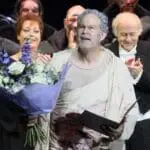On May 25th, VOICEBOX: Opera in Concert (OiC) presented the final show of their 51st season – the Canadian premiere of Robert le diable by Giacomo Meyerbeer. Robert le diable is not performed very often. Operabase.com lists less than 50 performances of the work since 2000, with none outside of Europe. This is a major decline in status for a work that was a huge success at its 1831 premiere, particularly enjoyed for the “scandalous” ballet of the dead nuns in the third act. Story has it that Frédéric Chopin declared Robert a “masterpiece.”
With its rich, full orchestration and important ballet, Robert le diable seems odd programming for OiC, which performs without benefit of an orchestra, costumes, set or dancers. The reduction of the piece to just its music, however, actually served it surprisingly well, highlighting the beauty and lyricism of Meyerbeer’s vocal writing.
In brief, the story tells of Robert, the Duke of Normandy, whose virtuous mother was seduced and abandoned by the devil. Robert is in love with Isabelle, a princess, but he has been befriended by the mysterious Bertram, who is actually his father (the devil) in disguise. Apart from Robert, Isabelle and Bertram, there are two other principal characters, Alice, Robert’s half-sister, and Raimbaut, the minstrel to whom she is engaged. The devil has a time limit – he has to get Robert to sign the scroll surrendering his soul by midnight – but mostly he is vanquished because Robert can’t decide whether to sign, and midnight just passes. Everything ends happily when the devil is drawn back to hell and both soprano/tenor couples are united in marriage.
Undoubtedly, one of the major obstacles to presenting this work is the extreme vocal challenges it poses for the three principals, and OiC had mixed success in that area.
Robert is a role that requires the lightness, high notes and facility of a Rossini tenor combined with the more robust singing common to later 19th-century roles. Tenor Matt Chittick handled the assignment well. Although he sometimes struggled with sudden jumps to his upper range, his voice is beautiful and agile, and he had a nice, grounded presence throughout the evening.
As Isabelle, soprano Holly Chaplin was the star of the evening. Her voice rang out freely in Jeanne Lamon Hall at Trinity-St. Paul’s Centre. She seemed equally at home in the coloratura passages of “Idole de ma vie” and the long phrases of “Robert, toi que j’aime,” and her sound appears to be produced with an ease that promises much for the future of this young artist. She could work to be more present as an actor and to explore different levels in her emotional range, but allowances should be made in a concert production.

Photo Credit: photos courtesy of VOICEBOX: Opera in Concert
Nicole Katerberg, Yanik Gosselin and Helen Becqué
Bertram is designated in the score for a bass-baritone – the two DVD performances, 1985 from Paris and 2012 from London, feature Samuel Ramey and Canadian John Relyea respectively – so baritone Evan Korbut is atypical casting for the role. While he sounded beautiful in the lyrical solo at the beginning of the second half, he lacked the resonance and power in the bottom part of his range to make the role really compelling or intimidating.
As Alice and Raimbaut, Nicole Katerberg and Yanik Gosselin were lovely in their OiC debuts. She had the larger role and created a strong presence onstage. She also showed good facility throughout her range. Gosselin’s scene at the opening of the third act was cut, which meant that he was really only featured in the opening scene, but he had a charming stage presence.
Longtime chorus master for OiC Robert Cooper demands precision and musicality from his singers, and that was evident in Robert le diable. Their offstage chorale, sung from the back of Jeanne Lamon Hall in the final act, was beautifully phrased and particularly moving. Members of the chorus at OiC also sing comprimario roles, and bass-baritone Joseph Ernst deserves special mention for his strong, clear tone in the larger role of Alberti.
Music director Helen Becqué provided strong accompaniment from the piano. She played firmly and brought out all the different lines in the orchestration, which is an almost impossible task in a score as dense as Meyerbeer’s.
Overall, this was a good production for OiC, highlighting the strengths of the company while providing an opportunity to hear a complete work that’s never been performed in Canada. The main floor was sold out, although – as we were told when general director Guillermo Silva-Marin introduced the evening – “there is a balcony.” Hopefully that balcony will also be full for their 2025/26 season, which features La sonnambula, Lost in the Stars and Richard Coeur-de-lion. More people deserve to hear OiC’s strong presentations of lesser-known work.
Opera Canada depends on the generous contributions of its supporters to bring readers outstanding, in-depth coverage of opera in Canada and beyond. Please consider subscribing or donating today.















